KASHMIRI CUISINE- WAZWAN
Blog Detail
Wazwan is an iconic multi-course meal that originated in Kashmir during the 14th century influenced heavily by Persian culinary traditions brought to the region by Timur a conqueror of Central Asia. The word "Wazwan" comes from two Kashmiri words: waz meaning cook and wan meaning shop. This meal traditionally associated with royalty became central to Kashmiri culture over the centuries symbolizing hospitality and the craftsmanship of the wazas (master chefs). Wazwan is considered a work of art because of the elaborate preparation techniques that often span several days.
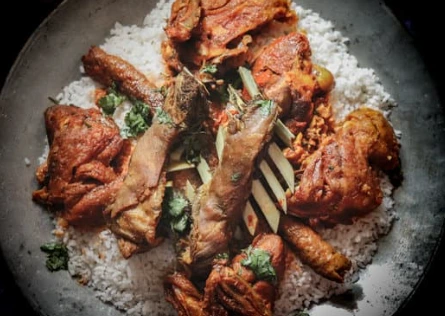
Overview of the Multi-Course Meal
A typical Wazwan consists of seven to thirty-six courses with the majority being meat-based particularly lamb and mutton. Each dish is meticulously prepared using specific ingredients and techniques often passed down through generations. Dishes like Tabak Maaz (lamb ribs) Rogan Josh (spicy lamb) and Gushtaba (meatballs in yogurt gravy) are some of the must-try items in Wazwan.
Importance in Social Gatherings and Celebrations
Wazwan holds immense cultural importance particularly in weddings festivals and other joyous occasions. It is a symbol of celebration and unity in Kashmiri society. The preparation and serving of Wazwan are central to wedding feasts making the event as much about social bonds as about the food. Serving Wazwan during a wedding signifies generosity and hospitality often marking the social status of the host.
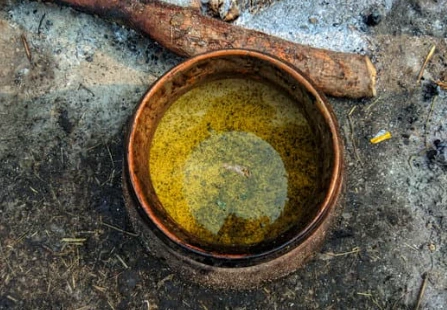
The Ritual of Serving Wazwan
The experience of a Wazwan feast begins with a set of important rituals that reflect both its cultural heritage and the communal nature of the meal.
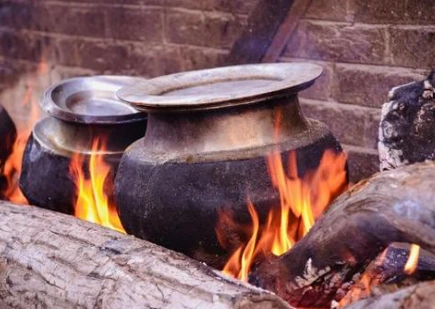
Traditional Setup: Serving on Large Copper Platters Called Traem
Wazwan is traditionally served on large copper plates known as traem which are shared by groups of four people. These copper trays are beautifully crafted and large enough to hold multiple dishes at once. Each traem is filled with rice and accompanied by a variety of delicacies such as Tabak Maaz (lamb ribs) Rista (meatballs) and Rogan Josh. Sharing the traem is an important aspect of the communal eating experience in Kashmiri culture as it fosters a sense of togetherness and harmony.
The Role of the Wazas (Master Chefs) in Preparing Wazwan
The preparation of Wazwan is an art form mastered by the wazas a group of skilled chefs trained in traditional Kashmiri cooking. These master chefs often come from families that have passed down their culinary skills for generations. They are responsible for preparing each dish with precision ensuring the perfect blend of spices and flavors. The preparation of Wazwan is time-consuming often taking several days of hard work. Each course is cooked under the watchful eye of the wouste waze (head chef) who supervises the junior cooks.
Washing Hands in the Tash-t-naer Before the Meal
Before the feast begins guests participate in a ritual hand washing custom. A portable basin known as the Tash-t-naer is carried around by attendants. This basin allows guests to wash their hands in preparation for the meal as cleanliness is considered essential before partaking in the feast. The handwashing ritual is a deeply ingrained part of Kashmiri hospitality and tradition reflecting respect for both the food and the people sharing it.
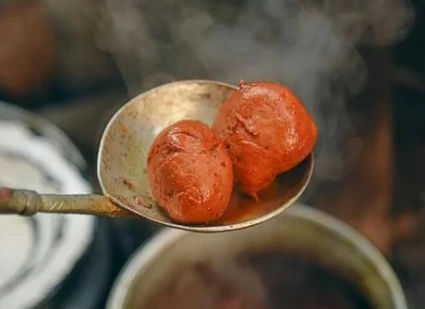
Key Dishes of a Wazwan Feast
- Tabak Maaz:
A standout dish in the Wazwan feast, Tabak Maaz consists of lamb ribs simmered in gravy of spices until tender. The ribs are then fried in ghee giving them a crispy exterior while retaining their juicy flavorful meat. This dish perfectly balances the richness of the meat. - Rista:
Rista are delicately spiced meatballs made from minced mutton and cooked in a red gravy infused with paprika saffron and fennel seeds. The meatballs have a smooth texture and are an essential part of any Wazwan feast. - Rogan Josh:
Perhaps the most iconic Kashmiri dish, Rogan Josh is a slow-cooked lamb dish known for its rich aromatic red gravy. The vibrant color comes from Kashmiri red chili and the dish is flavored with a blend of spices including cloves, cardamom, and cinnamon. - Gushtaba:
Traditionally served as the final dish of the Wazwan, Gushtaba is made from hand-pounded mutton meatballs cooked in a creamy yogurt-based gravy. These meatballs are larger and softer than Rista and are considered the grand finale of the feast. - Aab Ghosht:
Aab Ghosht is a milder lamb dish, where the meat is cooked in a milk-based gravy flavored with saffron, cardamom, and other aromatic spices. It stands out for its gentle sweetness and delicate flavors, making it a lighter option compared to other meat dishes. - Kabab:
Kabab refers to spiced minced meat usually lamb that is skewered and grilled over charcoal. These kebabs are flavorful and smoky often served as an appetizer during the Wazwan meal. - Korma:
A rich and flavorful dish often included in the Wazwan feast. This dish consists of tender pieces of meat usually lamb or mutton simmered in a creamy sauce made from yogurt spices and aromatic herbs. Korma is known for its smooth thick gravy achieved by slow-cooking the ingredients to allow the flavors to meld together beautifully. - Meth Maaz:
Meth Maaz, is a unique and flavorful dish in the traditional Wazwan. It's a spicy, stir-fried mutton preparation along with Fenugreek that's known for its bold and robust flavors. Unlike other Wazwan dishes that are slow-cooked with a thick gravy, Meth Maaz is relatively dry, allowing the spices to coat the meat fully, delivering an intense taste with each bite. - Chicken in Wazwan:
Although Wazwan is predominantly known for its mutton and lamb dishes chicken has found a place in modern adaptations of this traditional feast. Chicken in Wazwan is prepared with the same attention to detail and traditional Kashmiri spices bringing a lighter option to the meat-heavy meal. - Shami Kabab:
Shami Kabab is a delicious and finely textured meat patty that holds a special place in the Wazwan feast. Traditionally made with mutton or lamb, Shami Kababs are known for their smooth, melt-in-your-mouth texture and well-balanced flavor. These kababs are packed with spices, making them a flavorful yet tender addition to the multi-course meal.
Vegetarian Delights in Wazwan
Although Wazwan is predominantly meat-based, there are several delightful vegetarian options that bring variety and balance to the meal. Here are a few standout vegetarian dishes:
- Waza Palak:
This dish features spinach (palak) cooked with small meatballs called riste. The rich flavor of the spinach combined with the spices makes it a flavorful vegetarian option in the Wazwan feast. Sometimes it is served as a standalone dish without the meatballs. - Dum Aloo:
A Kashmiri specialty, Dum Aloo is made from baby potatoes cooked in a yogurt-based gravy seasoned with Kashmiri spices. The potatoes are fried and then slow-cooked absorbing the rich flavors of the spices creating a delicious and hearty vegetarian option. - Haak:
Haak is a traditional Kashmiri green leafy vegetable often compared to spinach but with a distinct flavor of its own. It is cooked simply in mustard oil flavored with Kashmiri chilies and basic spices allowing the natural taste of the vegetable to shine. Haak is typically served during Wazwan as a side dish providing a refreshing contrast to the rich meat dishes
People Also Ask
- What is special about Kashmiri Wazwan?
Kashmiri Wazwan is special because it is more than just a meal; it's a culinary art form that reflects Kashmiri culture and hospitality. The meal typically includes 7 to 36 courses with a heavy emphasis on meat dishes like Rogan Josh Gushtaba and Rista. What makes it truly unique is the way the dishes are prepared by master chefs called wazas using recipes passed down through generations. - How is Wazwan traditionally served?
Wazwan is traditionally served on a large copper platter called a traem shared by four people. Before the meal there is a handwashing ritual using a portable basin called the Tash-t-naer. The meal itself is an elaborate process where various courses are served one after the other with rice as the base accompanied by rich flavorful gravies and meat dishes. - What are the main dishes in Wazwan?
The main dishes of Wazwan include Rogan Josh (spicy lamb curry) Tabak Maaz (fried lamb ribs) Rista (meatballs in red gravy) Gushtaba (meatballs in yogurt gravy) Aab Ghosht (lamb in a milk-based sauce) and Kabab (grilled minced meat skewers). These dishes highlight the rich flavors and diverse cooking techniques in Kashmiri cuisine. - Is Wazwan only for non-vegetarians?
While Wazwan is heavily focused on meat it also includes a few vegetarian dishes like Haak (green vegetables cooked in mustard oil) Waza Palak (spinach) and Dum Aloo (potatoes in a spiced yogurt gravy). These vegetarian options provide a balanced contrast to the rich meat dishes and are enjoyed by all guests regardless of dietary preferences.
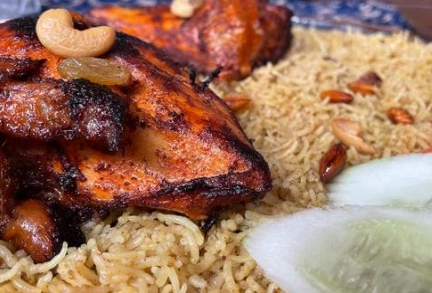
Conclusion
Wazwan is more than just a meal; it's a grand cultural experience that showcases the heart of Kashmiri hospitality and culinary tradition. Each dish meticulously prepared and infused with aromatic spices tells a story of heritage and craftsmanship passed down through generations. From the robust flavors of Rogan Josh to the delicate texture of Gushtaba every course is a celebration of Kashmir's rich food culture.
Sharing a Wazwan feast symbolizes unity, community, and warmth as guests gather to savor each dish together. The multi-course meal reflects the deep-rooted customs of Kashmir where food is an integral part of social gatherings celebrations and festivals.
Experiencing Wazwan is to journey through the flavors textures and aromas that define Kashmiri cuisine making it an unforgettable feast for anyone who partakes. This traditional meal is a tribute to the art of cooking and the warmth of Kashmiri hospitality leaving a lasting impression that resonates long after the meal is over.